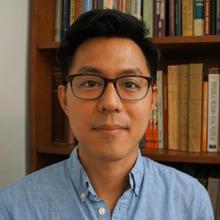By Donsub Rim
I came to the Applied Math Department at the University of Washington in 2012. I remember sitting next to a student from Iceland in a conference room in Guggenheim Hall and asking him if he was from Reykjavik. I also remember waiting for Professor Ioana Dumitriu to walk in and give her first lecture on Linear Analysis. I remember how surreal it felt to see Professors Randy LeVeque and Gunther Uhlmann in person - it was as if the people who I had met previously only through books and papers came to life. During my first quarter I was a teaching assistant for calculus (MATH 125), and I still feel as though I could remember everyone’s faces.
I recall spending many hours struggling with homework problems in Guggenheim in my first year. Some evenings I would spend the entire night there and work until the next morning. Although it was exhausting and sometimes stressful, it was very exciting. I enjoyed that sense of achievement and euphoria that followed. Weirdly enough, it did not matter so much whether I had solved a problem - it was rather the state of being puzzled that was exciting. I felt a sense of anticipation and excitement whenever there was something that I could not quite figure out. And once you’ve got it, you can never lose it. You are always able to revisit it to appreciate it once more.
People I have met in the department were very friendly. I felt I could always ask someone a question, and when I did ask they would invariably take a moment to think about it and give me their best opinion. There was a sense of warm camaraderie among the students. I reckon it is easy to become too competitive or lost in self-doubt that you become less inclined to discuss your problem openly, but the atmosphere in UW applied math was so disarming that I hardly recall any occasion when I was anxious about approaching others with my silly questions. The only struggle was with the research. Through it all, I feel I’ve made life-long friends through program, and am deeply grateful for having met them.
This friendliness seems in fact to be an overarching theme that you encounter all over the UW campus, and it makes for a great environment for broadening your horizons beyond what’s often traditionally considered mathematics. I was fortunate to have worked on a project related to tsunamis, so I was encouraged to talk to people in other departments such as Earth and Space Sciences, Civil Engineering, or Statistics. Even outside immediately relevant research, there are many resources you could find if you poke around. One day, Niket Thakkar spontaneously organized a weekly reading with his group in Chemistry Department where we read texts on electrodynamics. I learned a lot by participating in this reading.
As a consequence, it was not at all difficult to meet amazing people and learn from them at UW, and I find this to be the most fulfilling and valuable aspect of my graduate experience. Nonetheless, everyone in the program must have different passions and pursuits, and what each person gains during their stay is probably just as diverse as the individuals themselves. So even though it is not clear what it means to succeed in a PhD program, perhaps the most exciting and challenging problem is precisely this search for meaning. It is obvious that this is by far the most important exercise left to the reader, one that cannot be said to be trivial.
